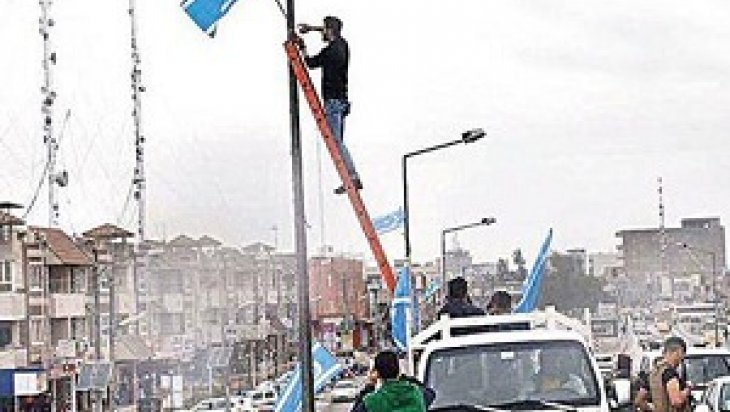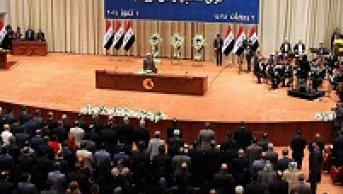Flag Crisis in Kirkuk

On 14 March 2017, Kirkuk governor Najmaldin Karim sent an official letter to the Kirkuk Provincial Council and gave instructions to unfurl the flag of federal government of northern Iraq next to the flag of Iraq, in all public institutions and organizations in Kirkuk. This instruction drew reactions from Turkmens and was condemned, through the statements indicating how misguided and dangerous this request was.
President of Iraqi Turkmen Front (ITF) and Deputy of Kirkuk Arshad al-Salihi strongly reacted, saying that “the governor played with fire”. Al-Salihi made the following statements in his speech: “Kirkuk governor plays with fire, by having the flag of Kurdistan raised in Kirkuk, which is precious to Turkmens and is a Turkish province, and he wants to trigger a fight between fellows in the province.”
Turkmen parties and political movements published a notice, condemning the instruction of Kirkuk governor to raise the flag of the Iraqi Kurdish Regional Government. Indicating that such a step would pose dangers for the harmony among Kirkuk people, they called the Prime Minister to explain the reason of this move by Karim.
Deputy of Kirkuk and ITF Deputy President Hasan Turan said: “Unfortunately, Iraqi government remains silent to these unconstitutional and unlawful acts. The current political conjuncture and the security status, in which 40% of Kirkuk governorate is occupied by DAESH, is not convenient for such instigative acts”.
In a statement made with respect to the incident, former Turkmen deputy Fawzi Akram Tarzi emphasized that unfurling the flag of Kurdistan in state institutions formed part of a systematical plan carried out by Kurdish parties to extend their own territories, within the context of disagreements among them, and these parties took advantage of the fight against DAESH and followed a fait accompli policy. He also called the President not to stand by the developments but to intervene with the problem.
This issue also drew the reactions of the federal government. Spokesperson of the Prime Minister, Saad Hadisi shared the following remarks in his official statement on 20 March: “It is inappropriate to raise a flag other than that of Iraq in state buildings or any other building outside the federal region of Kurdistan, since such issues fall within the scope of authority of the federal government. Kirkuk is one of the provinces within the scope of authority of our government and only the flag of Iraq should be raised in this province.”
Group chairman of the “State of Law” Coalition forming the Iraqi government, Ali al-Adib underlined that such act of Kirkuk governor was unconstitutional and raised concerns among the Iraqi people.
Well-known Iraqi legal expert Tariq Harb indicated that Kirkuk governor Najmaldin Karim committed an offence under Iraqi laws and acted against the Provincial Law. He also added: “Prime Minister Haider al-Abadi is entitled to dismiss any governor from office, upon a draft law he will submit to the approval of the parliament. Kirkuk governor has acted contrary to the provisions of law relating to the flag of Iraq”.
The Republic of Turkey did not remain silent regarding this development. As to the application made for raising the flag of Kurdistan Regional Government (KRG) together with that of Iraq in state buildings in Kirkuk on official dates, Spokesperson of the Ministry of Foreign Affairs Huseyin Muftuoglu gave the following warning: “Unilateral acts which will be taken with respect to the status of Kirkuk, without seeing the end of the process, have the danger of damaging the efforts of compromise and stability in Iraq. Such initiatives risk corroding the multicultural identity in Kirkuk, where Iraq’s social, cultural and economic wealth comes into being.” Press Office of the United Nations Assistance Mission for Iraq (UNAMI) also expressed its concerns, on 21 March, and pointed out that Kirkuk was under the jurisdiction of the Iraqi government, thus no flag other than that of Iraq should be unfurled. It also emphasized that any kind of unilateral step would endanger the peace and harmony among the ethnical and religious groups in Iraq.
Member of Reform Front in Iraqi parliament, Iskandar Watut issued a press statement and said: “Kirkuk is under the administration of the federal government. Therefore, the decision of Kirkuk governor is unconstitutional. Turkmens and Arabs, who constitute the majority in Kirkuk, have already clearly announced that they refuse to accept this decision. Kurdish side should act wisely in this respect.” In his statement, Deputy Watut called the parliament to dismiss the Kirkuk governor, who decided to raise the flag of Kurdistan in Kirkuk.
Kirkuk governor Najmaldin Karim justified the flag issue on the basis of Article 140 of the Iraqi Constitution and claimed that Kirkuk fell within the scope of this article. In a press conference, governor Karim responded to the statement of the United Nations Assistance Mission for Iraq (UNAMI) and said: “There is no article in the Constitution, banning the raising of Kurdistan flag in Kirkuk. The fellowship between the groups in Kirkuk will be further enhanced if the flag is raised in Kirkuk.”
Related to the matter within the framework of Iraqi Constitution, the law states that:
After Iraqi invasion in 2003, by the USA and multinational forces, an interim constitution was declared on 8 March 2004, under the name of “Law of Administration for the State of Iraq for the Transitional Period”. This interim constitution was repealed in accordance with Article 143 of the permanent constitution which entered into force on 20 May 2005. However, under the provisions of the same article, the paragraph (A) of Article 53 and Article 58 of the interim constitution remained in force, as part of the permanent constitution.
The mentioned paragraph (A) defined the provinces of Dohuk, Erbil, Sulaymaniyah, Kirkuk, Diyala and Neyneva as territories governed by Kurdish government on 19 March 2003. All regions of Kirkuk governorate, Kirkuk’s city center, Altun Kupri, Dibis, Taza Khurmatu, Daquq, Havijah and all Turkmen villages affiliated with the city center were left outside the scope of the definition and they remained affiliated with the central government.
Article 58 and the second subparagraph of Article 140 of the permanent Constitution described Kirkuk and “other unspecified regions” as “disputed” territories; and the future status of these regions –including Kirkuk– and the regions of which they would be part, would be based on the completion of three phases which needed to be completed until 31 December 2007 (normalization, census and referendum).
None of these phases has been completed even though more than nine years have passed since the deadline of 31 December 2007 and Article 140 has consequently lost its validity. Even though the mentioned article is still deemed valid, the will of Kirkuk people has not been manifested since the referendum has not yet been held. Therefore, all these areas are outside the Kurdistan federal region and affiliated with the central government in legal terms.
Accordingly, Kirkuk governor’s fait accompli policy is contrary to the content and spirit of the Constitution. Therefore, Iraqi Office of the Prime Minister, Turkish Ministry of Foreign Affairs and the United Nations Assistance Mission for Iraq have acknowledged this fact and underlined that the mentioned step is both misleading and dangerous.
On 28 March, the Kirkuk Provincial Council convened with the participation of Kurdish members. Turkmen and Arab members in the Provincial Council previously indicated that they would boycott any meeting where Kirkuk governor would request the raising of Kurdistan flag in Kirkuk. The decision was taken upon the affirmative votes of 25 Kurdish members in the council where there are already 26 Kurdish members. This decision drew strong reactions both from inside and outside Iraq.
The Ministry of Foreign Affairs announced that it was concerned about the raising of the flag of Kurdistan Regional Government in state buildings in Kirkuk. In the statement underlining that the decision raised concerns, the following remarks were also added: "We consider this decision, which was endorsed in a vote boycotted by the Turcoman and Arab members of the Provincial Council, as a unilateral act that directly concerns the disputed status of Kirkuk and that contradicts the Iraqi Constitution. Insisting on one-sided moves with regard to the status of Kirkuk, which is the common asset of Iraqi citizens of various identities, would undermine reconciliation, dialogue and commitment to the constitutional processes. Such approaches would also be detrimental to the efforts to ensure lasting security and stability in Iraq."
Turkish Minister of Foreign Affairs Mevlüt Çavuşoğlu made another statement after the decision was issued, emphasizing that this decision was wrong.
11th President of the Republic of Turkey, Abdullah Gül shared the following statement on Twitter: “Raising the KRG flag together with the Iraqi flag in Kirkuk would threaten the national unity and the solidarity among Turkmens, Kurds and Arabs in the province. Reviewing this unilateral decision which is contrary to the Iraqi constitution and acting in line with the constitution, together with all groups in the country, is of great importance for the stability of Iraq and the region. Having been already exhausted by the conflicts and sufferings, Iraq should not bring new troubles on itself.”
Delivering a speech at a panel held in virtue of the death anniversary of Turkmen researcher-author and lawyer Ata Terzibaşı, Chief Adviser to Turkish President Yalçın Topçu reacted to the instruction of Kirkuk governor to raise the flag of Kurdistan Regional Government (KRG) in state buildings and put emphasis on the following points: “Kirkuk is a sine qua non national cause for Turkey. I am closely familiar with several developments in Kirkuk and follow them. I am telling this as the Chief Adviser to the President and as a former minister. The initiative of Kirkuk governor is unfortunate and untimely, and lacks legal ground. The decision taken by Kurdish members of forty-one-member Kirkuk Provincial Council formed by 26 Kurdish, 9 Turkmen and 6 Arab members, will deal a death blow to the life, future, security, freedom, welfare and peace of Kurds, Turkmens and Arabs living in Kirkuk. We will take the wind of out of sails for those who try to make a fait accompli. No matter whether the flag is scarlet or azure, bearing enmity towards the star and crescent has never brought victory in the history. Kirkuk has a special status for Turkey. Turkmens, Arabs and Kurds have their rights in Kirkuk.”
While Turkmen members of parliament announced that they would object to the decision before the federal court, some Arab members of the Iraqi parliament started to call the parliament to reverse this decision.
In fact, Kirkuk is “a province which is not affiliated with any region” according to the Iraqi constitution. Therefore, the decisions of the central government are valid and lawful in this province. The Parliament is also authorized to reverse the mentioned decision of the Kirkuk Provincial Council. The 2010 law amending the provincial law entering into force in 2008, grants the parliament the right to object to the decisions to be taken by provincial councils affiliated with a federal region. If the relevant provincial council insists on the decision, the parliament is entitled to reverse this decision by absolute majority and even to abolish the relevant provincial council. If these steps are taken, all eyes will be on the Iraqi parliament and the decision which will be taken by the Iraqi federal court.








